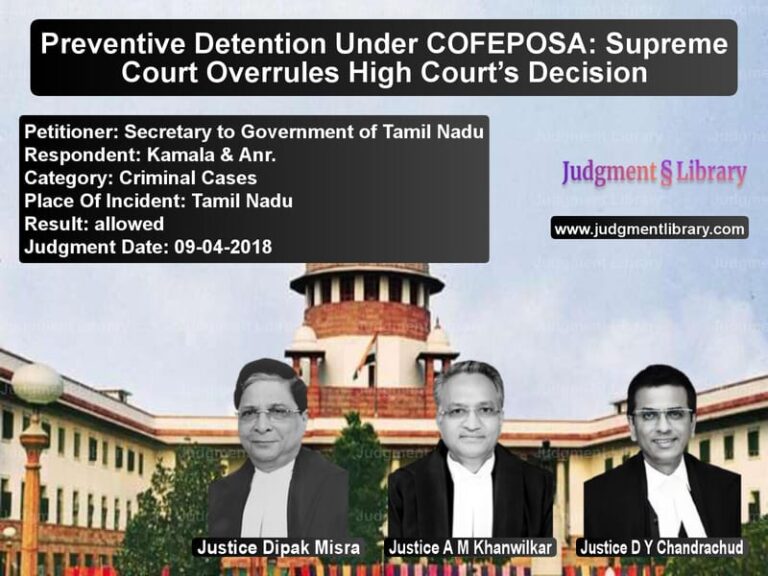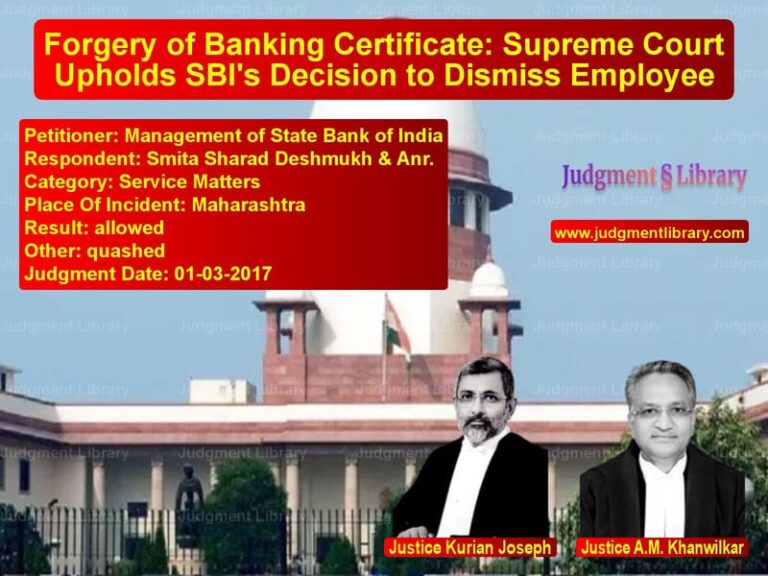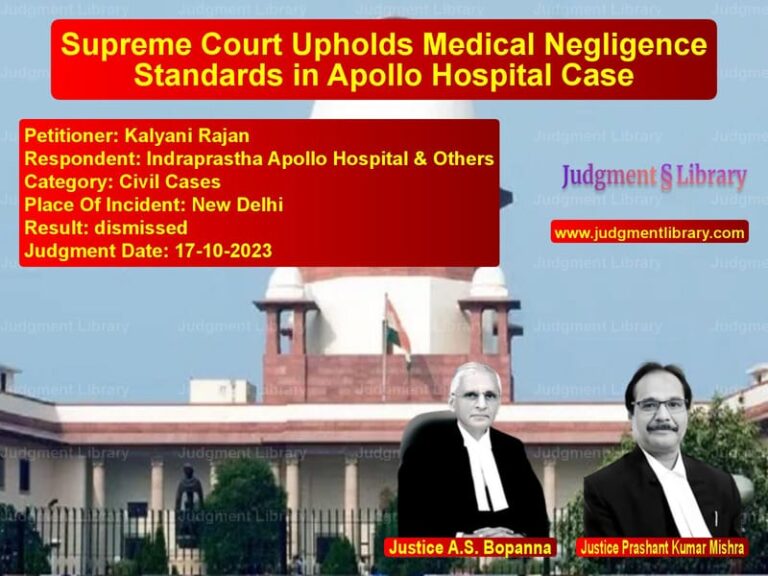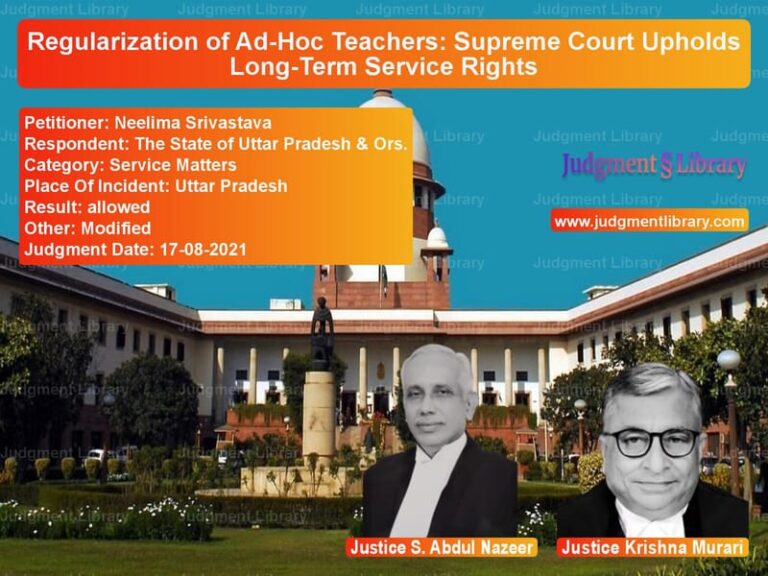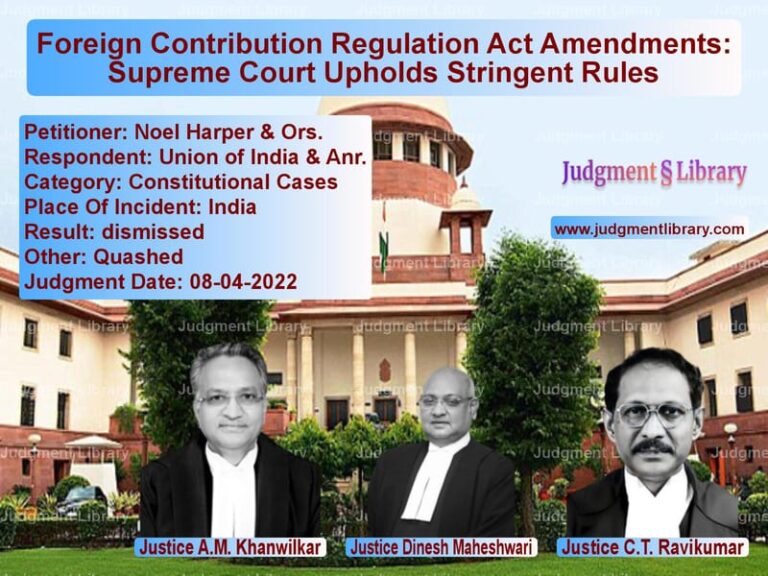Supreme Court Rules on Disciplinary Proceedings for Workmen in Industrial Establishments
The Supreme Court of India recently delivered a significant judgment in the case of Union of India & Ors. vs. K. Suri Babu & Ors., addressing the issue of whether disciplinary proceedings against workmen in industrial establishments should be governed by the Central Civil Services (Classification, Control and Appeal) Rules, 1965 (CCA Rules) or by the Standing Orders under the Industrial Employment (Standing Orders) Act, 1946. The Court ruled in favor of the employees, holding that disciplinary proceedings must be conducted as per the Standing Orders and not the CCA Rules.
Background of the Case
The case involved two employees, K. Suri Babu and M. Kiran Kumar, who were working as helpers at the Nuclear Fuel Complex (NFC), Hyderabad, a unit under the Department of Atomic Energy. They were accused of submitting fake educational certificates to obtain their jobs and were subjected to disciplinary proceedings under the CCA Rules, 1965. The employees challenged this action, arguing that as workmen, they should be governed by the Standing Orders certified for the NFC under the Industrial Employment (Standing Orders) Act, 1946.
The Central Administrative Tribunal (CAT) upheld the application of the CCA Rules, but the Andhra Pradesh High Court overturned this decision, ruling that the Standing Orders were applicable. The Union of India appealed this ruling before the Supreme Court.
Arguments by the Petitioner (Union of India)
The Union of India contended that:
- The appointment letters of the employees explicitly stated that they would be governed by the CCA Rules, 1965, including in matters of disciplinary action.
- The CCA Rules provided several benefits, such as pension and other entitlements, and hence, the employees could not selectively claim applicability of the Standing Orders only for disciplinary proceedings.
- A circular issued by the Department on 12.05.2005 clarified that NFC employees would be governed by the CCA Rules and not the Standing Orders.
- As per Section 13B of the Industrial Employment (Standing Orders) Act, 1946, industrial establishments covered under service rules like the CCA Rules were exempt from the Standing Orders.
Arguments by the Respondents (Employees)
The employees countered these claims, arguing that:
- They were classified as workmen under the Industrial Employment (Standing Orders) Act, 1946, and hence, disciplinary proceedings against them should be governed by the Standing Orders certified for NFC in 1973.
- The Standing Orders had statutory backing and were formulated to protect workmen from arbitrary actions by employers.
- The Standing Orders outlined the disciplinary procedures and any action against workmen must follow these rules.
- The Union of India failed to provide any notification under Section 13B of the 1946 Act that would exempt NFC from following the Standing Orders.
Supreme Court’s Observations
The Supreme Court examined the legal framework governing industrial workmen and made the following key observations:
- The Industrial Employment (Standing Orders) Act, 1946 was enacted to protect workmen from arbitrary employment conditions and ensure uniformity in disciplinary proceedings.
- The Standing Orders, once certified, become binding on both employers and employees, and override conflicting provisions in general service rules.
- The appointment order cannot override statutory provisions, and merely stating in the employment contract that CCA Rules would apply does not negate the applicability of the Standing Orders.
- The Union of India failed to produce a notification under Section 13B of the 1946 Act that would exempt NFC from following the Standing Orders.
- In the case of Hari Shankar Jain vs. U.P. State Electricity Board, the Supreme Court had already held that Standing Orders are special rules and override general service rules like the CCA Rules.
Key Excerpt from the Judgment
“The Industrial Employment (Standing Orders) Act is a special law in regard to the matters enumerated in the schedule, and the regulations made by the Board with respect to any of those matters are of no effect unless such regulations are either notified by the Government under Section 13B or certified by the Certifying Officer under Section 5 of the Industrial Employment (Standing Orders) Act.”
The Court emphasized that the Standing Orders had been in force at NFC since 1973 and had not been lawfully modified or revoked.
Final Judgment and Directions
The Supreme Court ruled as follows:
- The appeals by the Union of India were dismissed, upholding the judgment of the Andhra Pradesh High Court.
- Disciplinary proceedings against workmen at NFC must be conducted under the Standing Orders and not the CCA Rules, 1965.
- The order of status quo granted earlier was vacated.
This ruling reaffirms the principle that special laws, such as the Industrial Employment (Standing Orders) Act, 1946, prevail over general service rules in matters concerning workmen. The judgment protects industrial employees from arbitrary actions by ensuring adherence to prescribed disciplinary procedures.
Petitioner Name: Union of India & Ors..Respondent Name: K. Suri Babu & Ors..Judgment By: Justice Sanjay Kishan Kaul, Justice C.T. Ravikumar, Justice Sudhanshu Dhulia.Place Of Incident: Hyderabad, Andhra Pradesh.Judgment Date: 29-11-2023.
Don’t miss out on the full details! Download the complete judgment in PDF format below and gain valuable insights instantly!
Download Judgment: union-of-india-&-ors-vs-k.-suri-babu-&-ors.-supreme-court-of-india-judgment-dated-29-11-2023.pdf
Directly Download Judgment: Directly download this Judgment
See all petitions in Employment Disputes
See all petitions in Disciplinary Proceedings
See all petitions in Public Sector Employees
See all petitions in Termination Cases
See all petitions in Judgment by Sanjay Kishan Kaul
See all petitions in Judgment by C.T. Ravikumar
See all petitions in Judgment by Sudhanshu Dhulia
See all petitions in dismissed
See all petitions in supreme court of India judgments November 2023
See all petitions in 2023 judgments
See all posts in Service Matters Category
See all allowed petitions in Service Matters Category
See all Dismissed petitions in Service Matters Category
See all partially allowed petitions in Service Matters Category


